Camping and outdoor life are fun and enjoyable. The whole experience gets a massive boost if you have the best camping generator to run your various gadgets and electronics. We’ve analyzed multiple units and selected the top models of the best RV generator to power your recreational vehicle or to power your outdoor adventures. With the help of our comparison table and unbiased reviews, it should be easy to settle for one that suits your preference and needs.
Whether you want to power your RV, camper van, travel trailer, or campsite, we’ve got it all covered. We are including different generator types, fuel types, brands, and various sizes. In addition, we are offering a comprehensive breakdown of the most important features, options, accessories, and more. Don’t settle for anything less than your specific power needs, and get ready for a comfortable off-grid living.
The Best Generator for RV & Camping
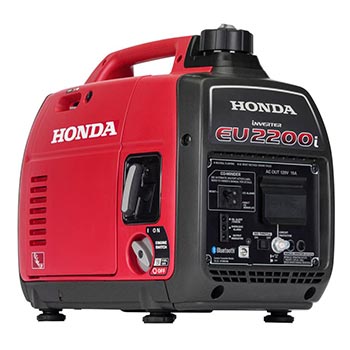
Honda EU2200i
Starting 2200W
Running 1800W
Fuel Type: Gas
Capacity: 0.95 gal
Run Time @ 25% Load: 8.1 hrs
Noise Level: 48 dBA
Weight: 47 lbs
Warranty: 3-Year
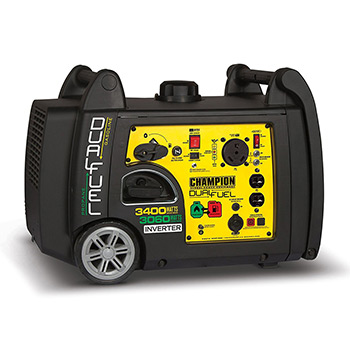
Champion 100263
Starting 3400W
Running 3100W
Fuel Type: Gas+Propane
Capacity: 1.6 gal
Run Time @ 25% Load: 7.5 hrs
Noise Level: 59 dBA
Weight: 95.7 lbs
Warranty: 3-Year

Generac GP2200i
Starting 2200W
Running 1700W
Fuel Type: Gas
Capacity: 1.2 gal
Run Time @ 25% Load: 11 hrs
Noise Level: 58 dBA
Weight: 46.6 lbs
Warranty: 2-Year
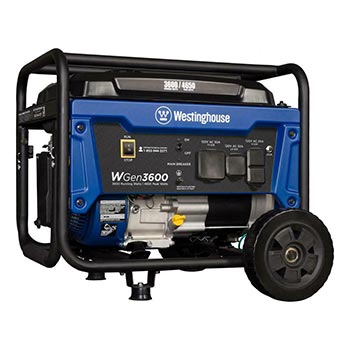
Westinghouse WGen3600
Starting 4650W
Running 3600W
Fuel Type: Gas
Capacity: 4.0 gal
Run Time @ 25% Load: 20 hrs
Noise Level: 68 dBA
Weight: 107 lbs
Warranty: 3-Year
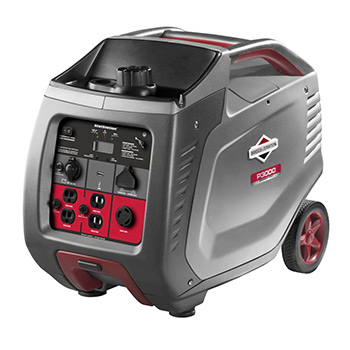
Briggs & Stratton P3000
Starting 3000W
Running 2600W
Fuel Type: Gas
Capacity: 1.5 gal
Run Time @ 25% Load: 10 hrs
Noise Level: 58 dBA
Weight: 84 lbs
Warranty: 2-Year
Best Generator for RV and Camping- Top 8
1. Honda EU2200i Inverter Generator

The Honda EU2200i is designed to be the perfect traveling companion. It is lightweight, very sturdy, fuel-efficient, and quiet enough to run all night at a campground. It is a carefully constructed generator for camping, RVing, and other recreational activities.
This inverter generator features a Honda GXR120 engine. It is capable of providing a starting wattage of 2200W and continuous wattage of 1800W. Equipped with advanced inverter technology, it delivers clean power for your RV appliances, including sensitive electronics.
This portable inverter generator is also fuel-efficient. It takes less than a gallon of gasoline and gives you about 4 to 9 hours of runtime. The smart throttle provides excellent fuel economy and noise reduction. The oil change is also simplified due to a longer spout and oil drain gutter. In addition, you get a 3-year commercial and residential warranty from a reputable brand that covers the generator from top to bottom.
You may also be interested to check Honda EU2200i full review
Pros:
- Easy to start thanks to Honda’s decompressor system that reduces the force needed. Operational contact points are also color-coded for easy guidance.
- Quiet power technology. Depending on the load, it produces between 48 to 57 decibels.
- Light weight, only 47 pounds. It has a compact enclosed design and a built-in handle making it transport-friendly.
- A fuel shutoff switch to automatically run the generator dry before switching off. Rather than manually draining the carburetor after each use.
- Being parallel capable, you can pair it with another unit to double the power output.
Cons:
- There is no fuel gauge, which makes it hard to detect the fuel level.
- For the price, it lacks a digital display so you can easily keep track of the generator’s status.
2. Champion Power Equipment 100263 Dual Fuel RV Ready

The Champion Power Equipment 100263 dual fuel generator is an excellent choice for camping, RVing, and boating alike. Its dual-fuel option with its easy selector switch means that it can run on either gasoline or propane, which may come in handy.
Rated at a maximum of 3400 watts surge and 3100 watts of continuous energy. It can power various appliances simultaneously and has enough juice to run a 15000 BTU RV air-conditioner. It also produces clean and stable energy, safe to use with delicate devices and electronics such as digital cameras, navigation systems, smartphones, and laptops.
At quarter load, this dual fuel generator can run over 7 hours on its 1.6-gallon gas tank and over 14 hours on a 20lb tank of propane. At such capacity, it will produce just 59 decibels of noise. And just as the name suggests, this generator is RV ready and RV friendly. It has a TT-30 receptacle, two household outlets, and a USB port.
You may also be interested in Champion Power Equipment Digital Hybrid
Pros:
- Fuel selector dial. It allows you to easily switch fuels with a quick switch dial. So you can operate your portable generator using either propane or gasoline.
- It has an economy mode that saves fuel and increases engine lifespan.
- Gives you the option to increase its power with an optional parallel kit that comes with a 50-amp RV generator outlet.
- It’s got a convenient electric start and has Cold Start technology ensures a quick start in cold weather.
Cons:
- It’s a heavy machine, weighing 96 pounds. Moreover, the handles are flimsy, and it requires you to tilt the generator at a low angle to use the wheels.
- For monitoring, it lacks an hour meter and a fuel meter.
3. Generac GP2200i Portable Inverter Generator

The Generac GP2200i is all power and no-frills. At 2200 starting watts and 1700 running watts, this camping generator can cover most of your power needs. Its 1.2-gallon fuel tank will give you almost 11 hours of clean and stable power at quarter load.
It has enough power to run various sensitive electronics. Additionally, it has an economy mode feature that allows the engine to adjust its speed to match the electrical output. Thus, better fuel consumption and reduced noise levels.
It works with a recoil pull start. With incorporated LED indicators for alerting the user when the unit is ready to use, overloaded, or low on oil.
This portable inverter generator is gas powered and has the perfect size for camping, tailgating, and power on the go. It’s also compact enough to fit in the bed of a pickup truck without lifting the tonneau cover. Overall, it’s a good, cost-effective solution designed for one thing, to produce power.
You may also be interested in Generac GP2500i
Pros:
- It has an integrated OFF/ON/CHOKE knob that simplifies startup procedures.
- It offers long run time on a single tank with the fuel economy mode.
- Weighs only 46.6 pounds. It’s lightweight, which makes it easy to carry around and store away.
- It’s also parallel capable, meaning you can connect two of these through a parallel kit for double the power.
Cons:
- It does not have a gauge for monitoring the fuel level.
- Some users may find it hard to run the engine on the first pull. It might take you more than one pull to start the generator.
4. Westinghouse WGen3600 Portable Generator

Westinghouse WGen3600 RV-ready portable generator provides a variety of premium features at a great value. It has a 212cc OHV powerful engine with a starting output of 4650 watts and a running output of 3700 watts.
Equipped with a large gas tank of 4 gallons that provides up to 13.5 hours of energy at half load. It’s a great RV portable generator for dry camping and boondocking.
It’s built inside a hardened steel frame for increased durability. Hence the heavyweight, 107 pounds. But the carrying handles and sturdy tires make for easy transportation.
Built with the RV camper in mind, it comes with a 30 amp receptacle, meaning no more searching for the right adapter to power your RV. It cranks easily and runs smoothly. It’s also EPA approved, CARB compliant for all 50 states, and has a spark arrestor that makes it safe to use in national parks and camping sites.
Pros:
- A built-in fuel gauge that lets you monitor the fuel consumption in real-time.
- Extended running time while supporting various applications.
- It has rubber covers for protecting the power outlets. It includes two household outlets, one TT-30R RV outlet, and one L5-30R outlet.
- Equipped with overload protection, low oil shut-off sensor, and automatic voltage regulation, all prevent damage and prolong the generator’s lifespan.
Cons:
- It can get louder than you’d like at full load.
- There is no hour meter. However, it has a VFT data center that provides the necessary maintenance schedule information to keep you well up-to-date.
5. Briggs & Stratton P3000 RV Ready Portable Generator

The Briggs & Stratton PowerSmart Series is designed with on-the-go power needs in mind. It has a starting output of 3000 watts and a running output of 2600 watts. It provides enough power to run the average RV air conditioner.
This portable inverter generator is also an excellent option for overnight power or long-time applications. At quarter load, the 1.5 gallon fuel tank will last for up to 10 hours of uninterrupted power. It has a convenient and easy to use control panel, allowing you to take control of the whole machine. It’s a sought after convenience, not standard with most inverter generators.
It weighs 85 pounds, which is a little heavy. However, it’s portable enough to fit in a caravan, and sports multiple handles for easy lifting. It has a luggage-style retractable handle and a built-in two-person carry handle. It also comes with two 6-inch never-flat wheels, they allow for easy movement even in rough terrains.
You may also be interested in Briggs & Stratton P2200
Pros:
- Enhanced fuel efficiency with an auto-idle control feature.
- LCD data display for monitoring the generator’s stats like energy usage and remaining running hours. It also serves as a maintenance reminder for oil and filter changes.
- Parallel ready, allowing you to maximize your power by connecting it with another P3000 or P2200 PowerSmart unit.
- Wide outlet selection. There are four standard 120V household outlets, one DC charger, one RV adaptor, and a USB port.
Cons:
- Inadequate sound insulation in the casing, which makes it sound louder than officially rated.
- Draining the oil is not an easy task without splashing out.
6. Yamaha EF2400iSHC Inverter Generator

Yamaha EF2400iSHC provides a peak wattage of 2400W and a continuous wattage of 2000W. It has a 1.6-gallon fuel tank that will run your electronics for a minimum of 8 hours at 25% load. There is also a fuel meter so that you can see the current gas level at a glance.
Supported by pulse width modulation (PWM), it produces clean electricity comparable to commercial power. As such, you can safely use it with sensitive electronic devices like smartphones and laptops.
You can also use it to run high-wattage appliances, such as most energy-efficient RV air conditioners, heaters, and microwaves. The high current output increases motor capability and improves efficiency. Allowing it to work in temperatures up to 110° F and run most 13000 BTU air conditioners. Not to mention, the inverter generator’s economy feature that results in a quieter generator that operates at maximum fuel efficiency.
You may also be interested in Yamaha EF2000iSv2
Pros:
- It has a smart throttle feature that automatically adjusts the engine speed to match the output load. It burns only as much fuel as needed.
- Equipped with multiple power outlets. It is packed with durable, heavy-duty power while maintaining user-friendliness.
- Ultra quiet operation. Depending on the electrical load, it lets out 53 to 60 decibels of noise.
- Yamaha generators offer the most extended engine durability ratings issued by the Environmental Protection Agency (EPA) and the California Air Resources Board (CARB).
Cons:
- It doesn’t provide a 30 amp receptacle.
- Pull start only. An electric start would be appreciated considering the price.
7. Champion Power Equipment 100522 RV Ready Generator

Designed with safety and convenience in mind, the Champion Power Equipment 100522 portable generator is a reliable power solution for RV camping. It is capable of putting out 4375 starting watts and 3500 running watts.
This portable generator is powerful enough to run high-power appliances and devices that you may have in your RV, such as the fridge, microwave, and the entire automobile’s lighting system. Not to mention, the 15000 BTU rooftop air conditioner with ease.
The engine is protected by a rugged steel frame that adds durability to the whole unit. With a large fuel tank of about 5 gallons, you’ll get a solid 12 hours of runtime at half load.
It comes fully equipped right out of the box. The package includes a wheel kit as well as a funnel for an easier oil change. It’s a useful addition to your RV or camping site that adequately meets your power needs and requirements. In addition, it has a three-year warranty and free lifetime technical support.
Pros:
- Cold start technology makes the generator start quickly during cold winters.
- Offers an extended runtime. It will run all night and save you repeated trips to the gas station.
- Intelligauge display. It helps you monitor the machine’s working hours, voltage, and frequency.
- Protected by Volt Guard, it has various power outlets. It has a 120-volt 30-amp RV receptacle that makes life a lot easier for RV owners. Plus, two 20-amp household outlets and one 30-amp locking outlet.
Cons:
- It’s really heavy as it has a weight of almost 110 pounds.
- There is no electric start. However, the recoil start is done right, and the machine starts on the first pull.
8. Westinghouse iGen4500 RV Ready Inverter Generator

The Westinghouse iGen4500 is among the most powerful RV generators on this list. Powered by a four-stroke, 7.3-horsepower engine.
This inverter generator is capable of putting out 4500 starting watts and 3700 running watts. It will fully power a 5th wheel RV with a 15000 BTU air conditioner.
Designed to provide clean power for all your sensitive appliances and electronics. It’s engineered to give maximum fuel efficiency with variable engine speeds to produce only the power you need at any given time. It takes 3.4-gallons of gas and will run for 18 hours at quarter load.
At 98 pounds, it features a suitcase style extendable handle and never-flat tires; it’s easy to roll around to different locations.
It gives you lots of connection options. With two 20 amp household outlets, two USB ports, and one 30-amp RV generator outlet. It makes it easy to plug in your camper or motor-home.
Pros:
- An array of starting options. The standard pull cord is complemented by an electric button start. Plus, a wireless remote start (via key fob) for added convenience.
- It has a long runtime with a large fuel tank.
- Extremely quiet. The decibel rating is 52 dBA at quarter load, just as a regular outdoor conversation.
- Real-time digital readout display. It keeps you informed of the remaining runtime, fuel, power output, voltage, and lifetime run hours.
- Parallel capable. So you can connect it through a parallel cord to another iGen series inverter generator to increase the power.
Cons:
- It’s a little challenging to fill the oil reservoir without making a mess. Better housing material and design would have been better.
- Some users report problems with the electronic choke, especially in cold temperatures. As a result, the remote and electric start may prove problematic to use.
Choosing the Best Generators for RV Camping
Picking the best camping generator is no easy task. Without the right information, you may end up with a generator that is noisy, bulky, or one that consumes fuel like nobody’s business. There are some essential factors to consider before buying a generator for your RV. Below are some of the key features that will help you choose the perfect portable generator.
-
Conventional vs. Inverter Generators
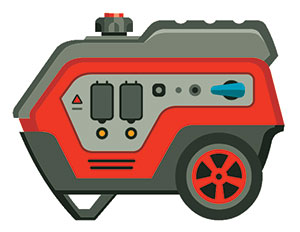
First, a good camping generator should work well with all the different electronics and appliances you have. Conventional generators are great for powering appliances that can withstand voltage fluctuations, such as lights and various machines. However, they are not the best choice for smaller devices that require consistent and clean power to work properly. Unstable power sources can damage delicate electronic devices, such as smartphones, tablets, and laptops.
This makes choosing an inverter type generator over a traditional one a much safer choice if you will be charging any sensitive electronics in your camping trips. Pure sine wave inverter generators deliver stable and reliable power with low THD, just like grid power or your wall outlet at home. They are also super quiet and fuel-efficient. However, they are typically more expensive.
You can also read our dedicated article about how to make your generator safe for electronics.
-
Fuel Type
The type of fuel used to run your portable generator may be an important factor to keep in mind. It depends on where you intend to use the generator and which fuel type will be easier to obtain.

- Gas-Powered: Gasoline is more budget-friendly and relatively cheaper than other fuel types. It’s easy to use and readily available.
- Propane-Powered: Unlike other types of fuel, propane has an indefinite shelf life. Propane generators runs quiet when compared to other types of portable generators.
- Diesel-Powered: Diesel generators are famous for their fuel efficiency. They are easy to operate and maintain, but they are not popular.
- Dual-Fuel: Such portable generators run on both gasoline and propane. Their dual fuel capacity makes them convenient in case you run out of either of the fuel types.
- Solar-Powered: Solar generators produce power from the free energy of the sun collected by the solar panels. They work in silence and are eco-friendly, with no emissions. A solar generator or a solar power station with solar panels is great for powering low-wattage devices.
-
Your Specific Power Requirements
Your power requirements are primarily influenced by the appliances and electronics that you intend to power. An ideal portable generator for camping purposes rated at 2000 watts is perfect for powering various gadgets. This range provides enough power to run your smartphone, laptop, fan, camera, lights, and small tools.
However, to fully power up your motor-home, you need a generator rated at 3000 watts or more. It will allow you to comfortably run heavy-duty appliances, like that RV window air conditioner, fridge, microwave, or other tools.
For example, an under-counter camper refrigerator requires around 180W running power and about 600W start-up power. Large RV refrigerators can require up to 400W to run and 1200W to start-up.
When it comes to the AC, which is usually the most power-draining appliance of all. An 8000 BTU AC will require about 700W to run and about 1800W surge power to start. A larger 13000 BTU AC will need around 1500W to run and approximately 3000W to start. While a 15000 BTU AC unit requires about 1800W running watts and around 3500W to start.
You should always calculate your wattage requirements and choose a generator with at least 10% to 20% more running watts than your estimated needs.
-
Noise Level
The noise portable generators produce is measured in decibel (dB). Many manufacturers are developing innovative sound-dampening systems to ensure that their engines are as quiet as possible. For example, Honda’s two-tiered noise dampening system.
Portable inverter generators rated at 60 decibels or less are the best in this regard. At that noise level, you can comfortably have a conversation and be less of a distraction to your neighboring campers. It should be noted that as the power rating of a portable inverter generator increases, its noise level is bound to increase as well. If you want more power, you should, therefore, expect a little bit more noise.
It’s also important to note that some campsites and RV parks can have noise-restrictions for power generators. Some campgrounds only allow portable generators to work during specified hours. At the same time, national parks only allow for operating portable generators or inverter generators that do not exceed 60 dBA, measured from a distance of 50 feet.
-
Portability
Your power source should be light enough to make your travels more portable. Camping generators are usually not heavy or bulky, and they can easily be moved around by one person. They can weigh anywhere from 40 pounds up to 250 pounds. However, portable RV generators should have wheels and adjustable handles for convenient handling and movement.
The portability and power rating of a generator usually go hand in hand. The more powerful the generator, the larger its size will be. In an attempt to generate more power, highly rated generators incorporate many parts, making them bulky. Moving such generators, therefore, becomes difficult. To solve the issue of portability and power, you can choose to parallel connect two smaller units together to increase the power output. This way, you can easily move the inverter generators from place to place and effectively meet your power requirements.
-
Fuel Efficiency
Fuel efficiency is another aspect that you have to consider. Larger RV generators have bigger fuel tanks, which often means extended runtime. But this also means a bulkier and heavier unit. The top camping generators, in this case, are those that can adjust their engine speed according to the applied load. When you only have light appliances connected, the engine automatically lowers the speed, resulting in minimum fuel consumption. The engine should only be engaged in a full-throttle mode only when it is necessary. Thus longer runtime, which is also ideal for overnight power.
-
RV Plugs and RV-Ready Generators
RVs have special shore power cords and plugs for getting power. They can have different amperage, depending on the RV size. The standard amperage for RV plugs is either 30 Amp or 50 Amp. Smaller RVs usually have 30 amps, while larger ones, with big rooftop AC units, most often have 50 amps.
Most campsites provide shore power sockets for RV plugs, but you will need an RV-ready generator to provide electricity for your RV. First and foremost, most generators have a DC 12V 8A battery charging outlet and two or more AC power outlets. A generator that has a TT-30R outlet, otherwise known as the RV30, is all set for powering an RV. The number 30 indicates the amperage provided by the AC outlet. If your portable generator does not have an RV30 outlet, do not worry. A 30 Amp outlet can be plugged into a generator with a 15A outlet with an adapter.
What is important to keep in mind is that you can adapt the amperage only down, from 50A to 30A or 30A to 15A, but not vice versa. The best outlets to adapt to TT-30R are the L5-30R and L14-30R. The former is a 120V outlet, while the latter is a 120V/240V outlet.
Another thing is the types of plugs your RV has. Non-locking plugs, simply plug into your outlet, while twist locking plugs screw into the outlet, so you don’t have to worry about them unplugging. If you do not have a locking plug, you can always purchase one. When it comes to power cords and plugs, make sure you get a long enough cable. We recommend a 50 feet cable.
-
Engine Start System
Different generators have different igniting systems to start-up the engine. Generators with a manual recoil system require you to turn the fuel valve, choke, and engine switch before pulling the recoil cord and starting the engine.
Generators with an electric start button also require you to turn the fuel valve and choke on, while the electric engine switch directly starts up the motor itself.
Additionally, some generators have a wireless remote start system and can be turned on by a convenient remote control. The distance between the generator and remote key fob can vary depending on the generator model.
-
User-Friendly Features
User-friendly features allow for such generators for camping to be easier to operate and use. These features cover automation and generator monitoring. The low-oil shutdown is one of those user-friendly features that prevents engine damage if the generator runs low on oil.
A visible fuel gauge for monitoring the oil level or gas is another added feature. An LCD or a Volt-meter are other great user-friendly features. A wireless remote start may also be considered an extra useful feature in some situations, giving you the option to start and stop your generator from afar.
-
Environmental Compliance
Before buying, pay close attention to the generator’s environmental compliance. Some generators for camping can be incompatible with local, state, or federal regulations regarding emissions and other factors.
For example, some generators may not ship to California due to specific emissions certification requirements. CARB-compliant generators for camping pass some of the world’s strictest air quality standards.
Other generators may lack USDA-approved spark arrestor or other safety features. Generators with USDA-qualified spark arrestors or mufflers meet the USDA standards for areas where spark arrestors are mandatory for operation.
Read the fine print to ensure you received a safe and legal power generating unit, and contact the manufacturer for additional documentation if anything is unclear.
For optimal use of your generator, you can also check our list of the most useful accessories for portable generators.
Get the Best Out of Your RV Generator
So far, we have discussed all the most important things you need to know when choosing a portable generator for your RV or camping trip. However, there are some other things you need to keep in mind when choosing your generator of choice. These points will make sure you get the most out of your machine.
-
Cords and Cables
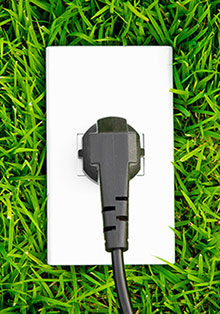
Electricity flows through a power cord as water flows through a pipe. The bigger the pipe, the better the water flow will be. Get the most out of your portable generator and the appliances you are powering with it using properly sized cords. The reason is long and light gauge power cords can decrease your RV generator’s efficiency.
Standard extension cords are 16-gauge, which is pretty slender, as a smaller number indicates a thicker cable. You can have a heavy 12-gauge cord with a three-outlet tip powering the fridge and coffee maker. Then a 14-gauge cord running a power strip, with a TV and lamp plugged into it. Perhaps also a 16-gauge RV power cord around the RV to run outdoor lights or fans. Keep the cords as short as you can so that electricity can travel smoother and faster from the generator to your devices.
To be able to use the power generated by your portable RV generator with the different appliances and systems in your RV, then you need to make the right connections. RVs use a transfer switch connected the electrical panel. A transfer switch is a three-way switch that can switch between two inputs and connect them to a single, standard input. Proper connection ensures seamless power delivery to the recreational vehicle and eliminates instances of electrical hazards that are a result of poor connection and cabling.
Prior to making the connection, you need to make sure that the inverter generator you are using is compatible with the electronics and appliances that you have.
-
High Altitude
The performance of generators decreases at high altitudes and temperatures. This results in reduced total wattage available for power consumption.
On average, you lose about 3% of the generator’s power capacity for every 1000 feet in elevation. This is due to the decrease in air density. That is true for all generators, regardless of the brand. They will function perfectly fine, just with less power. For example, at 11000 feet, your portable generator will operate with 33% less capacity.
-
Parallel Operation
Some portable inverter generators have a feature called parallel operation. It allows for two generators to be connected and function as one, which doubles their power output.
Most often, you can only parallel operate two identical generator models. This is true for Honda models. For example, using a special cable, you can parallel operate two EU2200i portable inverter generators together. Honda also has a companion version of the EU2200i with a built-in 30A receptacle, making it ideal for RVs.
Some brands allow parallel operating different sizes using a parallel operation kit that makes them compatible with multiple inverter generator sizes.
-
Cover or Gen-tent
Weather changes are bound to happen on a camping or RV trip. Operating your portable generator outside when it’s rainy can be dangerous and should not be done without proper protection. To keep your generator away from harm’s way, get a generator cover or tent, and secure it from all kinds of weather.
A gen-tent is a small tent designed to fit portable generators and protect its crucial parts, like outlets and the control panel. It usually has a window opening that allows you to access the fuel tank and refill it without removing the whole tent. Generator covers are the same, but they cover the entire generator. Most are waterproof and all weather-sealed.
-
Carbon Monoxide Detector
The CO guard or CO minder is an additional feature that is present in some inverter generators. It makes the portable generator automatically shut down if harmful, high carbon monoxide levels are detected in its operating area. The CO guard is a smart system that will shut the inverter generator off only when it detects a high concentration of carbon monoxide to prevent inconvenient false shutdowns.
You can also install a CO detector to your RV or trailer. It measures the amount of carbon monoxide in the RV and will emit certain alarm patterns to alert you in case of a leak.
Learn more about some of the most essential items for dry camping here.
Bottom Line
Well, maybe finding the best generator for camping or the best generator for RV is no easy task. However, we believe that our comprehensive buyers guide and individual camping generator reviews will make this process a whole lot easier. In our RV generator reviews, we revealed some of the best RV generators on the market today from different brands. With the options we have presented, it should effectively meet all your power requirements. Whether you are camping, tailgating, or spending time in your caravan or boat, with all this information, you are now well placed to make the best decision regarding the best camping generator that you should acquire.

